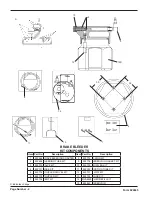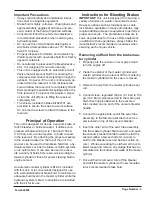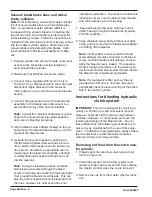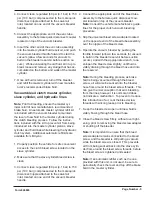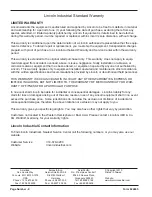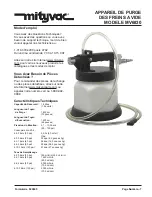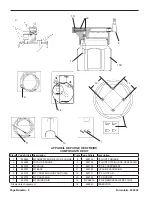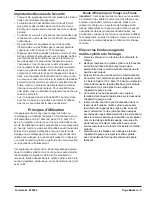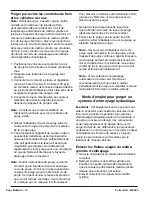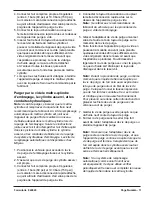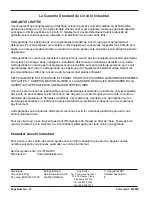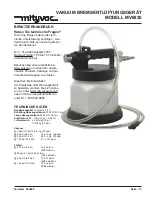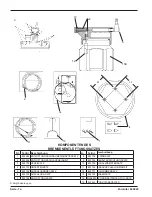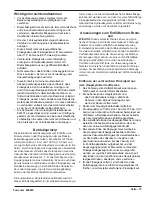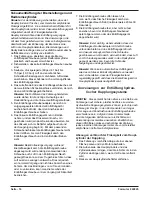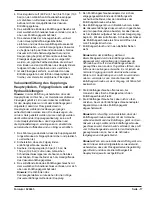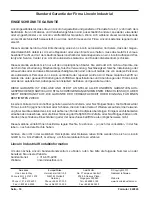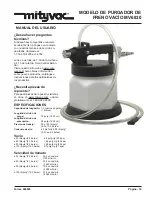
Page Number - 4
Form 824845
Vacuum bleed brake lines and wheel
brake cylinders
Note:
Prior to bleeding, ensure the master cylinder
is full of new manufacture’s recommended brake
fluid. An automatic master cylinder refill kit is
included with the vacuum bleeder to maintain the
level of new fluid in the master cylinder during the
brake bleeding process. Follow the instructions in-
cluded with the kit to prevent air from being sucked
into the master cylinder pistons, brake lines, and
wheel cylinders while bleeding the brakes. Addi-
tional automatic refill kits are available from Mity-
vac.
1. Properly position the vehicle for safe convenient
access to the brake bleed screw located on
each wheel brake cylinder.
2. Make sure that all bleed screws are clean.
3. Connect clean, regulated (60 psi (4.1 bar) to
150 psi (10.3)) compressed air to the male quick
disconnect nipple attached to the swivel air
inlet, located on one end of the vacuum bleeder
handle.
4. Connect the appropriate end of the bleed tube
assembly to the female quick disconnect cou-
pler located on top of the vacuum bleeder.
Note:
Consult the vehicle manufacturer’s guide-
lines for the proper wheel bleeding sequence
and vacuum bleeding procedure.
5. Slip the bleed screw adapter located on the op-
posite end of the bleed tube assembly, over the
nipple of the bleed screw.
6. Operate the vacuum bleeder by pushing the
throttle forward (allow a few seconds for vacu-
um to build in the bleeder reservoir before suc-
tion occurs), and with the appropriate wrench,
loosen/open the bleed screw slightly, until fluid
is visibly draining through the bleed hose and
into the reservoir.
Note:
During the bleeding process, as brake
fluid is being vacuumed through the bleed
screw, air will also be sucked into the bleed tube
from around the bleed screw threads. This can
give the misconception that air is bleeding from
the lines, however it is normal and does not
indicate a malfunction. To prevent or reduce this
introduction of air, coat the bleed screw threads
with silicon grease prior to bleeding.
7. Keep the bleed screw open until new fluid is
visibly flowing through the bleed tube (typically
20 to 30 seconds).
8. Close the bleed screw firmly, without over tight-
ening, prior to removing the bleed screw adapter
or shutting off the bleeder.
Note:
It is important to ensure that the bleed
screw adapter remains connected to the bleed
screw, and the bleeder is still pulling a vacuum
while the bleed screw is closed. This prevents
air from being sucked back into the wheel cylin-
der from around the bleed screw threads, before
the bleed screw is tightened and sealed.
Note:
If an automatic refiller such as the one
provided with this unit, is not used, be sure to
periodically check the level and top off the brake
fluid in the master cylinder.
Instructions for bleeding hydraulic
clutch system
IMPORTANT:
This unit is designed for servicing a
variety of vehicles in a safe, convenient manner.
However, hydraulic clutch systems vary between
vehicles, in design, in components, and even the
location and design of the bleed screw. Due to
these differences, the following procedures are to
serve only as a guideline for the use of this equip-
ment. In addition to these guidelines, always follow
the manufacturer’s recommended procedures
when servicing each unique vehicle.
Removing old fluid from the clutch mas-
ter cylinder
1. Properly park the vehicle on level ground and
turn the engine off.
2. Clean the exterior of the master cylinder and
master cylinder cap to prevent dirt from entering
the master cylinder when the cap is removed.
3. Remove the cap from the master cylinder reser-
voir.


